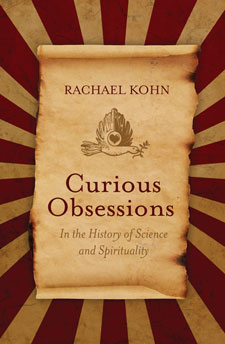Ideas that were once widely credited but that we now find absurd or horrifying are a limitless source of human fascination. Rachel Kohn, the presenter of ABC Radio's The Spirit of Things, has selected some of the stranger episodes of religion and science for our entertainment.
 Curious Obsessions: In the History of Science and Spirituality takes us on a stroll through Convents and Medieval Christian Feminism, Giordano Bruno (for whom a Sydney radio station is, we learn, named), Madame Blavasky and theosophy, Theresa of Avila and the Mystics and much else besides.
Curious Obsessions: In the History of Science and Spirituality takes us on a stroll through Convents and Medieval Christian Feminism, Giordano Bruno (for whom a Sydney radio station is, we learn, named), Madame Blavasky and theosophy, Theresa of Avila and the Mystics and much else besides.
Lest the Sydney Anglican consider Protestant culture immune from intellectual eccentricity, let's not forget British Israelism " the curious and yet once widespread notion that the 10 lost tribes of Israel settled (where else?) in the British Isles. This theory may have few adherents now; but it was similar ideas which gave birth to (still flourishing) Mormonism.
Rachel Kohn does not consider issues of ultimate truth. Religion, for the purposes of this book, is simply a sociological phenomenon. Occasional passages would be rejected outright by biblical Christians: in one chapter, Kohn propagates the theory (which she represents as verified by scholarship) that there was a female goddess equivalent of Yahweh in pre-exilic Jewish belief, traces of whose existence can be found in the Old Testament. This leads into a discussion about "religious patriarchy' in general; and in particular as to whether there has ever been a "matriarchal religion'.
But on the whole this is an edifying read: the varieties of folly exposed in the book, for the most part, only confirm what the apostle Paul wrote to the Romans, that:
Although they knew God, they neither glorified him as God nor gave thanks to him, but their thinking became futile and their foolish hearts were darkened. Although they claimed to be wise, they became fools, and exchanged the glory of the immortal God for images" they exchanged the truth of God for a lie.
There is much here that is enlightening and thought-provoking.
We are meant, I guess, to suppose Nazism the crime (of omission, if not commission) of Christians; but Kohn locates its origins in a nineteenth century Teutonic mania for ancient Hinduism. So it was that the swastika, the Indian good luck symbol which adorns old editions of Rudyard Kipling, became the emblem of the Third Reich.
A now forgotten romantic author, Guido List, mingled pagan and nationalist ideas in a series of influential novels, whose combination of pseudo-scholarship and popular prejudice finds echoes, Kohn suggests, in Dan Brown's The Da Vinci Code.
The West's attraction to Eastern religion is also explored, but only cursorily. For a more analytical look at this phenomenon, try Arthur Koestler's long out-of-print but masterful The Lotus and the Robot.
Kohn's subtitle embraces both religion and science because, as she seems to be saying, utopianism and collective madness are not the exclusive product of either, but a universal human weakness.
L Ron Hubbard and Mary Baker Eddy are two religious leaders who claimed to abolish the distinction between religion and science altogether. Hubbard's Scientology is a magnet for celebrities of commerce and cinema; but who still remembers Eddy's Christian Scientists? They believed disease was suffered only by those with inadequate faith; and won law suits for their children to be exempted from classes about health and hygiene.
The final chapter gives us a potted history of utopianism, from Sir Thomas More who coined the word, to latter prophets of the perfect society, both theist and atheist " the Australian socialist William Lane, the American radical Jim Jones, and cults such as the Orange People and Branch Davidians.
Kohn doesn't attempt to draw some strained conclusion from her various topics. This book seems to be the product of mere curiosity and can be dipped into with pleasure by anyone with the same motive.






















